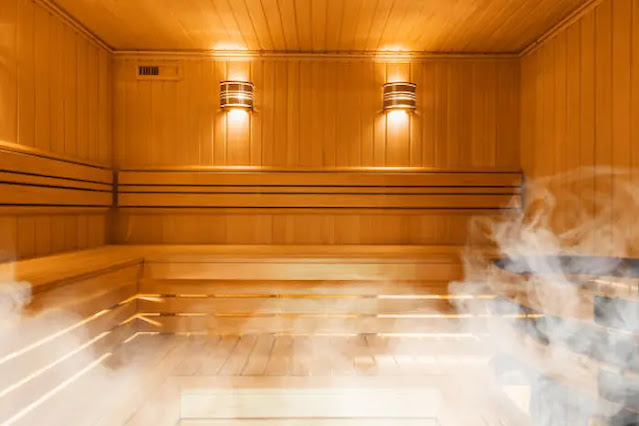The benefits of sauna for heart health, be sure to sit in the sauna after completing exercises in the gym. Although many people think that the sauna is a form of luxury and relaxation only, it is in fact a great option to enhance the health of the heart and body.
What is a sauna bath?
The use of saunas dates back thousands of years, and sauna bathing is a type of heat therapy that is performed in an enclosed space heated by electricity, wood burning, or infrared waves, and temperatures in the sauna range from 158 to 212 degrees Fahrenheit (70 to 100 Celsius) Although the ideal humidity for a sauna ranges from 10% to 20%, it is considered a form of dry heat. Many people use the sauna to relax and improve their general health. Experts believe that the sauna helps in the following cases:
- arthritis.
- chronic fatigue
- cold symptoms
- muscle soreness
- psoriasis
- pressure.
Sauna and heart health
Spending some time in a sauna can be very beneficial for your heart, because spending a few minutes in a sauna can produce a pint of sweat due to the heat's ability to raise your skin temperature and stimulate excessive sweating, and your heart rate can go up to between 100 and 150 beats. per minute because your body is trying to cool itself.
The effect of using a sauna is similar to that of light to moderate exercise in that it stimulates blood vessels to dilate, improving blood circulation and lowering stress levels. As a result, there are additional benefits to using a sauna:
Lowering blood pressure
Research from the past few decades has revealed that sauna use helps lower blood pressure almost immediately, so combine exercise with sauna visits for the best results. According to recent studies, using a sauna for 15 minutes three times a week after exercise lowers blood pressure significantly more compared to just exercising.
Reducing total cholesterol
High blood cholesterol is one of the main risk factors for heart disease. Cholesterol is a waxy substance found in cells. The risk of heart disease can be reduced by 30% by lowering total blood cholesterol by 10%. The good news is that sweating can increase HDL or "good" cholesterol levels, which is good for your health.
Exercising will undoubtedly help you sweat, and using a sauna alone can lower total cholesterol levels in your blood. However, the combination of the two spending time in the sauna after your workout is the best way to make a significant impact on your total cholesterol.
Increased cardiorespiratory fitness
Cardiorespiratory fitness (CRF) is your body's ability to deliver oxygen to your muscles and organs while performing physical activities, thus increasing cardiorespiratory fitness can reduce your risk of heart disease and death.
Regular exercise is one way to raise your cardiorespiratory fitness levels. Regardless of your cardiorespiratory fitness levels, research has revealed that using a sauna for 15 minutes after exercise will enhance cardiorespiratory fitness more than exercise alone, and can reduce the risk of death. due to heart problems, including sudden cardiac death.
Reducing the risk of death due to heart disease
Heart disease is the fifth leading cause of death in the United States, and sudden cardiac death usually occurs without prior symptoms, and according to research, taking a sauna bath may help reduce the chance of heart disease, and according to a study that followed 2,300 sauna users for 20 years, those who used the sauna more regularly (four to seven times a week) had a lower risk of heart disease and stroke-related deaths.
What is the safe way to use the sauna?
Using a sauna is generally harmless, but please keep in mind the following tips to prevent any unwanted health complications associated with using a sauna:
- Drink plenty of water before, during, and after sauna use, to prevent dehydration and to replace lost fluids.
- Set a time of no more than 20 minutes for sauna sessions, and it is preferable to start with shorter sessions for beginners (5 to 10 minutes), and gradually increase to 20 minutes.
- Alcohol increases the risk of dehydration, avoid drinking it before or during sauna use.
- If you are pregnant or have low blood pressure, consult a medical professional before using a sauna because using a sauna can lower blood pressure.

